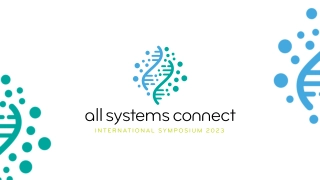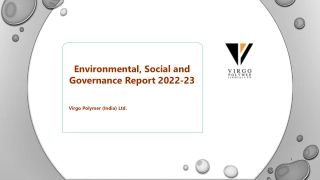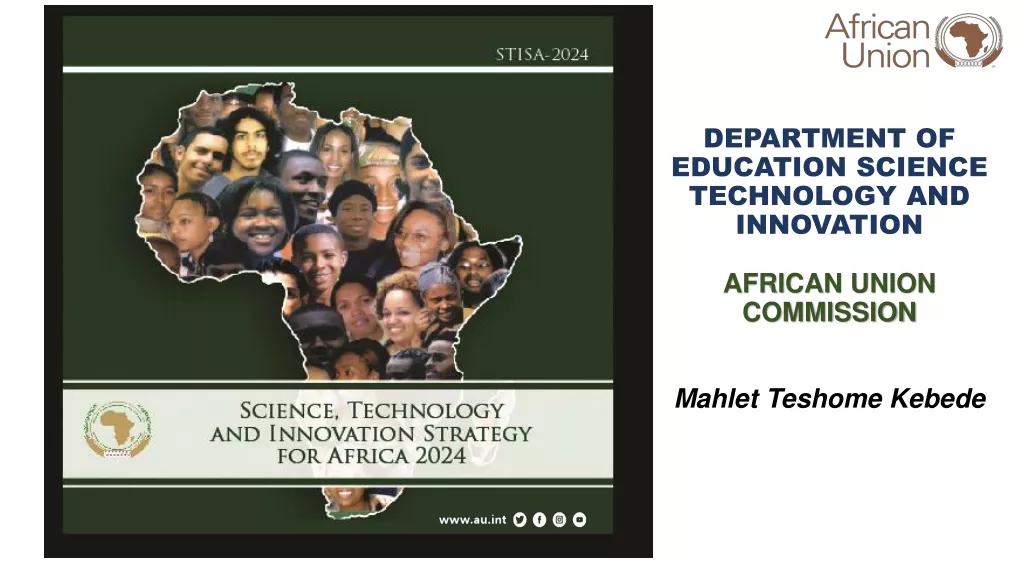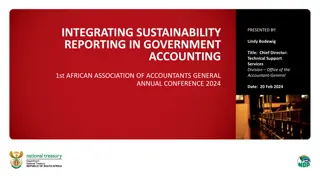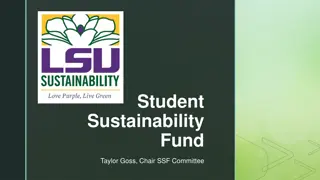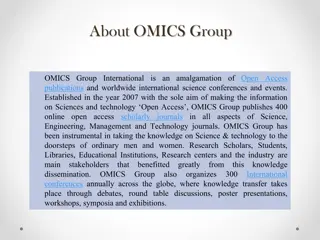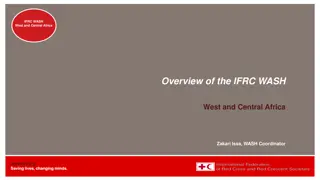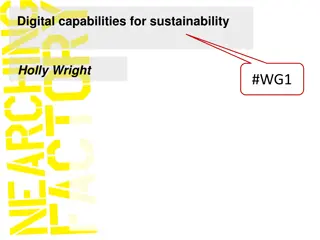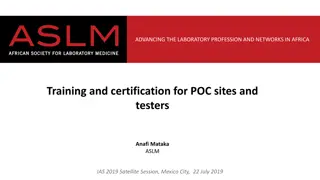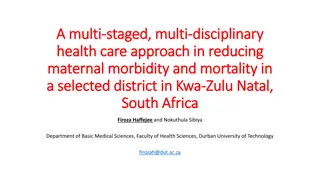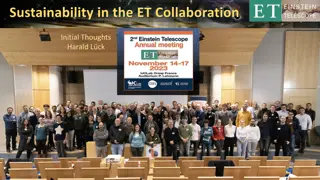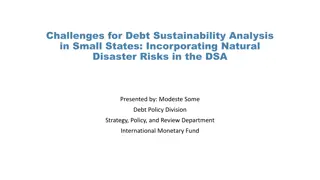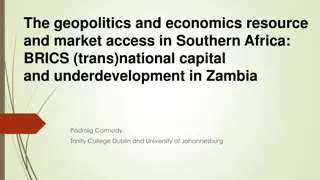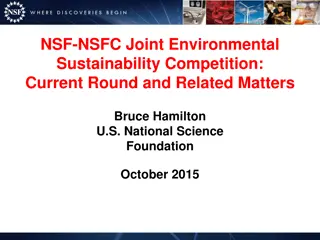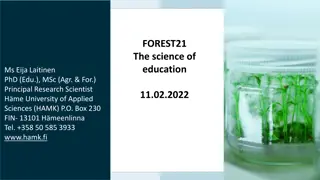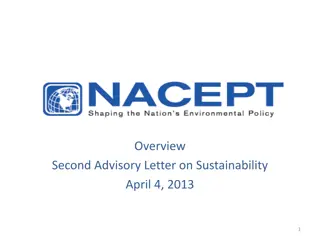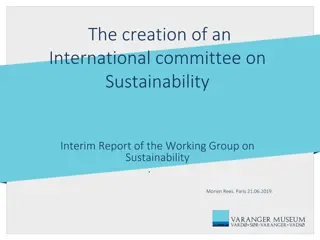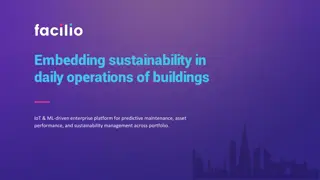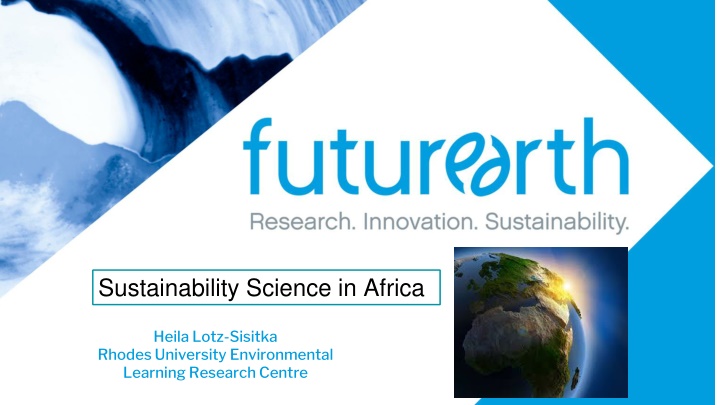
Sustainability Science in Africa: Addressing Challenges, Advancing Knowledge
Sustainability Science in Africa focuses on addressing environmental challenges such as climate change, biodiversity loss, and extractivism. It aims to bridge the gap between knowledge and action while seeking transformative solutions. The role of the Future Earth Africa Hub is essential in advancing Sustainability Science on the continent through scoping studies and collaborative efforts. The current international consensus emphasizes the need for more collaborative science communities to address sustainability challenges effectively.
Download Presentation

Please find below an Image/Link to download the presentation.
The content on the website is provided AS IS for your information and personal use only. It may not be sold, licensed, or shared on other websites without obtaining consent from the author. If you encounter any issues during the download, it is possible that the publisher has removed the file from their server.
You are allowed to download the files provided on this website for personal or commercial use, subject to the condition that they are used lawfully. All files are the property of their respective owners.
The content on the website is provided AS IS for your information and personal use only. It may not be sold, licensed, or shared on other websites without obtaining consent from the author.
E N D
Presentation Transcript
An introduction Sustainability Science in Africa Heila Lotz-Sisitka Rhodes University Environmental Learning Research Centre
Sustainability science focuses on issues relating to sustainability and sustainable development as core parts of its subject matter. It is "defined by the problems it addresses rather than by the disciplines it employs" and "serves the need for advancing both knowledge and action by creating a dynamic bridge between the two". Sustainability Science & Africa In Africa, Sustainabilty Science aims to address legacies of nature-culture dualism and fact-value dichotomies characteristic of imperial sciences, and global North development paradigms (even as carried in the SDGs). Most African economies remain dependent on natural resources they are indelibly affected by numerous environmental challenges such as climate change, land and water degradation, loss of biodiversity, and ongoing extractivism. environment relations have by and large been subjugated or ignored, and must therefore be a key feature of African Sustainability Sciences and their advancement. It is multi-, inter- and transdisciplinary and involves scientists from a diversity of disciplines, who work with actors outside of academia to (co) produce knowledge in response to sustainability challenges. African ontologies, epistemologies and human- These issues contribute to forced migration, intra- and inter-communal conflicts, ecological regime shifts, and insecurity in food, energy, and water systems, hence affecting the wellbeing of current and future generations. It has a strong transformative intent, and engages ethics questions such as current and future generations.
The role of the Future Earth Africa Hub To advance Sustainability Science in Africa (Science Clusters) & to strengthen African Voice and contributions in the global Sustainability Science arena (GRNs) and the Future Earth network To start we will undertake a scoping study on Sustainability Science in Africa : baseline document informing the Regional Nodes and ongoing development of Science Clusters
Current international consensus (ISC) that science is not currently effective at contributing to transformative, systemic change required for the people and planet s healthy well-being. The ISC report attributes this gap to the [often narrow] approaches and purposes of science and a lack of bold, strategic, and collaborative action from governments, science policy makers, science funders, scientists, the private sector and civil society . A demand for moving away from competition and fragmented science towards building collaborative science communities and incentivizing such collaboration between and among scientists and practitioners addressing sustainability challenges via research co-design, knowledge co-production, and catalyzing real-life change.
For Africa, main GEC issues identified include: Agriculture, fisheries, food, and nutrition; climate change and natural resources; energy; waste management; and science, technology, and innovation (STI) Additionally, Water quality and security, (iii) access to land, land degradation and biodiversity loss, (iv) air quality, (v) urban planning and infrastructure development, (vi) population growth, (vii) human health and wellbeing, and (viii) just social transformation (including environmental education and skills development, future of work). 60% of young Africans are not employed; making green, circular economies a key focus of development and transformation
Sustainability Science Leadership: some issues identified so far reactive education, science and learning systems that embody the colonial and a traditional approach to education, research teaching and practice, disciplinary and fragmented approach to addressing the complex sustainability challenges, low levels of teaching and learning for change, inadequate global appreciation of and response to African contexts, science needs and agendas, knowledge and diverse ways of knowing coupled with imposed global definitions, agendas, and sustainability science research approaches, a lack of political will to steer the growth and development of sustainability science coupled with a focus on economic growth at the expense the production of public/common good, and low levels of coordinated collaborative knowledge co-production among African researchers, which is worsened by the migration of African researchers, language barriers and an inability to keep up with new data technology and open science movement, donor dependence and externally funded research that does not respond to contextual needs and realities coupled with lack of government investment and support in research, and a lack of a critical mass of influential, Africa-conscious, African sustainability science leaders in the global science and policy landscape.
Scoping study will focus inform the: Advancement of sustainability science and sustainability science leadership Cluster building Institutional roles and contributions Funders engagement Thank you!

